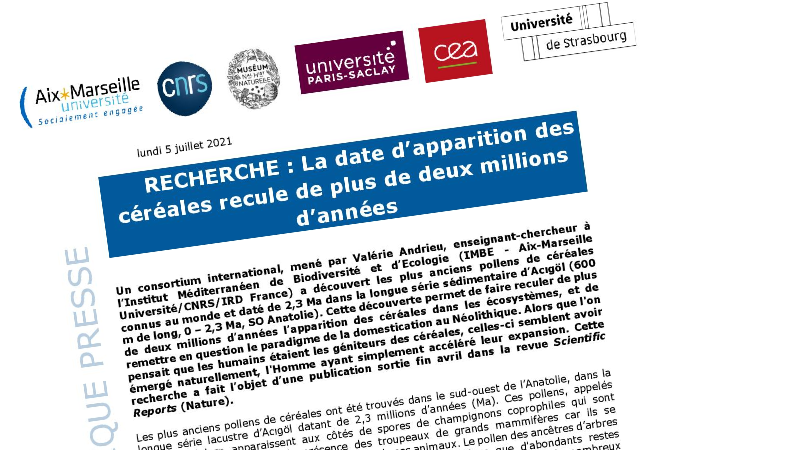
An international consortium, led by Valérie Andrieu, teacher-researcher at the Mediterranean Institute of Biodiversity and Ecology (IMBE - Aix-Marseille Université/CNRS/IRD France) has discovered the oldest known cereal pollens in the world and dated to 2.3 Ma in the long Acıgöl sedimentary series (600 m long, 0 - 2.3 Ma, SW Anatolia). This discovery sets back the appearance of cereals in ecosystems by more than two million years, and challenges the paradigm of domestication in the Neolithic. While it was thought that humans were the progenitors of cereals, they seem to have emerged naturally, with humans simply accelerating their expansion. This research was published at the end of April in the journal Scientific Reports (Nature).
The oldest cereal pollens have been found in southwestern Anatolia, in the long Acıgöl lake series dating back 2.3 million years (Ma). These pollens, called "proto-cereals" appear alongside spores of coprophilic fungi that are excellent indicators of the presence of large mammalian herds because they grow exclusively on the excrement of these animals. Pollen of ancestors of cultivated trees (olive, walnut, chestnut, hazelnut Prunus), as well as abundant fossil remains of large mammals (mammoth, rhinoceros, okapi, camel and many horses and cattle) have also been found.
While the appearance of cereals was previously attributed to the "invention" of agriculture by humans, this research supports an alternative hypothesis. The proto-cereals are thought to have originated from wild grasses whose emergence may have been promoted by herds of large herbivores attracted by the fresh waters of Lake Acıgöl. Through trampling, soil nitrogen enrichment and grazing, herds of large herbivores may have altered the genotype of the proto-cereals naturally present in Acıgöl, thus promoting the emergence of modern cereals. Hominin populations, present in southwestern Anatolia around 1.4 Ma may have benefited from the presence of cereals in herbaceous ecosystems.
At the regional level, Valérie Andrieu will continue her research on the subject from September 2021 at the Mediterranean Institute for Advanced Research of Aix-Marseille Université (IMéRA). This research will focus on proto-cereal pollens, dating back to 1.1 Ma ago, discovered in Marseille. If the presence of proto-cereal pollen is confirmed elsewhere on the globe, it will require a fundamental revision of the global vision of the history of human nutrition.
More information: Andrieu-Ponel V., Rochette P., Demory F., Alcicek H., Boulbes N., Bourlès N., Helvaci C., Lebatard A., Mayda S., Moigne A.M., Nomade S., Perrin M., Ponel P., Rambeau C., Vialet A., Gambin B., Alçiçek M.C. in press, 2021. Continuous presence of proto-cereals in Anatolia since 2.3 Ma, and their possible co-evolution with large herbivores and hominins. Scientific Reports (Nature), 11, 8914. https://doi.org/10.1038/s41598-021-86423-8
Mediterranean Institute of Biodiversity and Marine and Continental Ecology
Valérie Andrieu - Teacher-researcher
valerie.andrieu[a]univ-amu.fr

